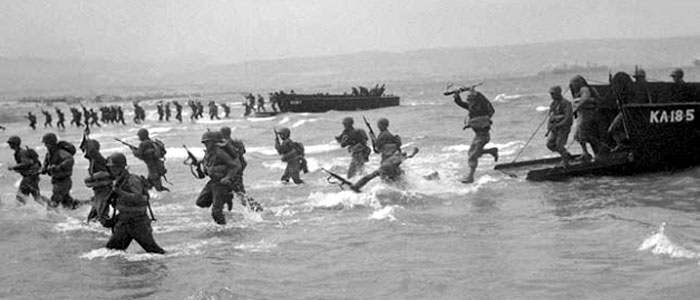Lessons of D-Day remain fresh after 70 years
Joshua Rovner is SMU’s Tower Distinguished Chair in International Politics and National Security Policy, talks about the importance of D-Day on the 70th anniversary of the Allied invasion of Europe.

Rovner talked about D-Day but said a D-Day type of amphibious assault is long gone in American warfare. However, it is important to undersand that war is unpredictable and that chance and uncertainty can play key roles, he said.
Listen to the interview. 
Rovner's Earlier Comments:
“We are unlikely to see anything like D-Day in our lifetimes, simply because the global balance of power has changed so much in the last 70 years. Nazi Germany invested huge amounts of money and resources in its attempt to make the French coastline impenetrable. Today there is no similar rival, so the notion of a massive amphibious assault against a heavily fortified beachhead is pretty unlikely.
“That said, there are several enduring lessons from D-Day. One is the importance of contingency and chance. In the months leading up to the invasion, the Allies had gained dominance over the air and built a huge fleet of vessels to cross the channel. They had also put in motion an extraordinary deception campaign to confuse Nazi leaders about the actual location of the landings. But despite all these advantages, they still relied on a fortuitous break in the weather that made the crossing possible.
D-Day landing at Normandy on June 6, 1944.
(Photo by Robert Capa)“Today some U.S. leaders have become enamored of military technologies that they think can lift the fog of war. They promote a vision of war that begins with ‘blinding’ attacks that confuse enemies, while relying on speed and precision to rapidly take control of the battlefield. Clearly the United States enjoys huge technological advantages over countries like China, but leaders should be wary of assuming that this will mean and quick and bloodless victory in the event of conflict. War is characterized by uncertainty. The weather might not break our way the next time around.”
About Joshua Rovner
Joshua Rovner is SMU’s Tower Distinguished Chair in International Politics and National Security Policy, Director of Studies for the Tower Center for Political Studies, and associate professor of political science. Rovner writes extensively on strategy and security. His recent book, Fixing the Facts: National Security and the Politics of Intelligence, is a wide-ranging study about how leaders use and misuse intelligence.
Rovner's research interests also include international relations theory, nuclear weapons, grand strategy, and U.S. defense policy. He has written on intelligence before and after the September 11 attacks, strategy in the wars in Iraq and Afghanistan, and possible responses to nuclear proliferation. Rovner is reviews editor for The Journal of Strategic Studies.
###
